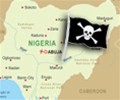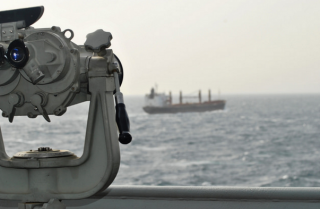Maritime Piracy: Is there conspiracy against Nigeria?
There are indications that the upcoming security report on Nigeria’s marine space may worsen with operators accusing international interest groups of mischief over the report.
But Nigerian maritime industry stakeholders also indicated that despite the controversial nature of the figures on piracy attacks the number of incidences would certainly increase and Nigeria would maintain lead on the global piracy ranking in the second quarter, 2018.
The International Maritime Bureau, IMB, in its first quarter 2018, Q1’18, reports, noted that Nigeria currently leads in global pirates attacks against vessels.
In the IMB report, Nigeria alone recorded a total of 22 of the 45 as against Indonesia that recorded nine attacks and Venezuela has five attacks in the first three months of the year.
Global pirate attacks while four other countries namely Venezuela, Indonesia, Republic of Benin and Bangladesh recorded a total of 23 attacks.
A breakdown of the report showed that Bangladesh recorded four and Republic of Benin had five while.
Although, maritime security experts have contested the figure of the IMB, saying that number of attacks recorded in Nigeria during the quarter is likely to be lower, some foreign shipping firms confided in Vanguard Maritime Report that Nigeria do not have credible data as information on attacks go straight to the foreign ship owners who in turn report to the international organization (IMB) rather than Nigerian authorities.
Some Nigerian operators have played down the figures, attributing it to plans by the developed countries to paint developing countries such as Nigeria, in security bad light, leading to increase in freight rates and marine insurance. Speaking with Vanguard Maritime Report, President of the Ship-owners Association of Nigeria, SOAN, and Managing Director/CEO of Starzs Marine and Engineering Limited, Greg Ogbeifun, said the report should not be taken serious as it is only meant to promote the interest of international operators.
According to him, “Personally I am not too bordered about piracy or whatever, they are always working to paint Nigeria black. I am not moved by their comments and that is the truth. They are the ones that are encouraging all these strives and unrest in all the developing countries and then they will also turn around to begin to complain.
“I said there wouldn’t have been piracy in this country if there were no international connection to illegal bunkering. Those people are the ones behind all these problems we talk about. So they should stop stoking all these improprieties against developing countries, they should stop encouraging it.
“All the piracy money, all the kidnapping money that they are collecting, who is collecting it, are they paying the money into Nigerian banks? They are not paying the money into Nigerian backs; they are paying it into foreign countries.
“They are the ones encouraging it, some I do not think that we should be overly blaming ourselves or feeling bad because some foreign body says that Nigeria has now become a hub for piracy.”
On whether members of SOAN has not been affected he responded, “Am not aware of any of my members who have been affected, most of the piracy attacks take place far away from the coast of Nigeria, it is not necessarily in-country attack. There was a time we use to have such attacks but for sometimes now we have not had in-country piracy attacks.”
Similarly, the Chairman of the Port Facility Security Officers, PFSO Forum, Dr. Ignatius Uche, agreed with school of thought that there could be a conspiracy against Nigeria in this regard.
He said that the issue of pirate attacks on vessels at the terminal has put virtually every government agency operating at the ports on their toes as the management of the Nigerian Ports Authority, NPA, has approved money for the purchase of patrol boats to checkmate the activities of these criminals.
Uche described the situation as very embarrassing adding that the trend was beginning to put Nigeria on the spot in the international maritime comity.
He said that figures being bandied by the IMB are not the same with what is recorded by the Nigerian authorities.
According to him the official Nigerian figure should be around 13 attacks in Q1’18.
But going by this figure Nigerian would remain the global leader in piracy as the second highest number of attack recorded by IMB is Indonesia with 9 attacks.
However, Uche said “the more these criminals are allowed to operate, the more money and credibility the country is losing.
An official of International Ship and Port Facility Security, ISPS Code Unit of NIMASA who spoke to Vanguard Maritime Report on the condition of anonymity said that the issue of pirate attacks on vessels was an international conspiracy by the international shipping community. The officer said that Nigeria get reports of these attacks from the international maritime organizations as crewmen make these report directly to the principal abroad.
The official explained that when these attacks take place, it places high freight premium on Nigerian bound cargoes which attracts more freight payments and marine insurance premium.
Former Senior Special Adviser to Ex-President Goodluck Jonathan, Mr. Leke Oyewole, told Vanguard Maritime Report that “as long as that security gap remains, that there is no proper patrol around the ports and the anchorage, this trend will continue.
“For the second quarter 2018 report the figure is likely to increase if nothing is done to stem the tide of pirate attacks on vessels.”
The fear of increase in pirates attack is coming against the cancellation of a maritime security contract by President Muhammedu Buhari due to the protest by a section of maritime stakeholders against what they saw as unwholesome interest in the deal.
The cancellation of the contract was commended by maritime security experts saying that it was absurd for the nation’s Navy to work under a foreign private security firm as provided in the contract terms.
The Nigerian piracy headaches had come a long way prompting the former management of NIMASA to structure an international security contract with Global West Specialist Vessels to address the problem.
Under the arrangement NIMASA and Nigerian government was not going to pay any contract sum for the security, rather the contractor would be expected to beef up security to enable NIMASA make money from the ships. In turn the contractor would earn a percentage of the extra revenue.
But this arrangement was cancelled by the current administration on grounds that the contract was a conduit pipe to siphon monies from the agency.
However, a new security contract was initiated by the present administration where Nigeria would pay USD195 million (about N60billion) to a private security firm for beefing up security at the territorial and coastal waters.
But the contract amount raised so much dust that the National Assembly was forced to invite the Minister of Transport, Mr. Rotimi Amaech, who refused to appear before its committees set up to look into the contract.
Eventually President Mohammadu Buhari was forced to cancel the contract and ordered that the USD50 million upfront payment be recovered by the way of getting the foreign contractor to supply items equivalent to the amount.
The contract, signed off by the Federal Executive Council in December 2017, would have seen the contractor, HSLi, an Israeli security firm, rake in $195 million in exchange for an undisclosed number of special mission aircraft, special mission helicopters and 12 fast intervention vessels for the Nigerian Navy.
Reacting to the cancellation of the contract Amaechi, Oyewole, while commending President Buhari for cancelling the contract, said that if that contract had been allowed to work, it would have been worse than the Global West contract. He said that the Nigerian Navy is the authority with legal powers to monitor and protect the nation’s maritime domain adding that the Navy should be funded and provided with patrol boats.
“I fully support the cancellation of that contract simply because it would have been worse than the Global West contract because the Navy cannot be subjected to work under a foreign private company.
“It is odd for the Nigerian Navy to work under it. It is an absurdity that is inconsiderable. To that extent I support the cancellation of that contract.
“In the time of Global West, though it was not security firm, the whole of Nigeria cried foul.
“The Navy is the only authority that has the mandate to secure the nation’s maritime space. The Navy should be properly funded and patrol boats should be provided for them.
“During the Jonathan era, Global West contract with NIMASA worked out perfectly. What they (NIMASA) did was to sign an MOU with the Navy and gladly enough, Navy came on board to subdue piracy in Lagos and other maritime space across the Nigerian waters which continue until 2015.
“As soon as the NIMASA-Global West was pulled down, there was space for the rascals to operate again.
“They started by operating off-shore, now they have developed the effrontery to operate even at the ports which is very bad for Nigeria because the freight of goods coming to Nigeria will increase.
“This development is not telling any good story about Nigeria.”
Way forward
Oyewole suggested that the NPA, the Nigerian National Petroleum Corporation, NNPC, and the NIMASA should form a synergy to provide a security platform, where NNPC can provide fuel and NPA and NIMASA can provide money to buy the boats for Navy to operate so as to build a sustainable arrangement to protect the territorial integrity of Nigeria.
He suggested that there is a need for the country to have a robust surveillance system adding that all processes of ship operations and payments are integrated with the surveillance system.
Oyewole said that there must be electronics platform to report any infractions by vessels anywhere in the country.
“A special maritime force should be created and sustainable funding mechanism and the Automated Identification System, AIS, be replaced with a better technology.
The AIS should be improved upon and make our waters safe so that the payment of high freight rate and marine insurance premium which has been the target of the foreign shipping firms be stopped,” he stated.
Source: Vanguard




